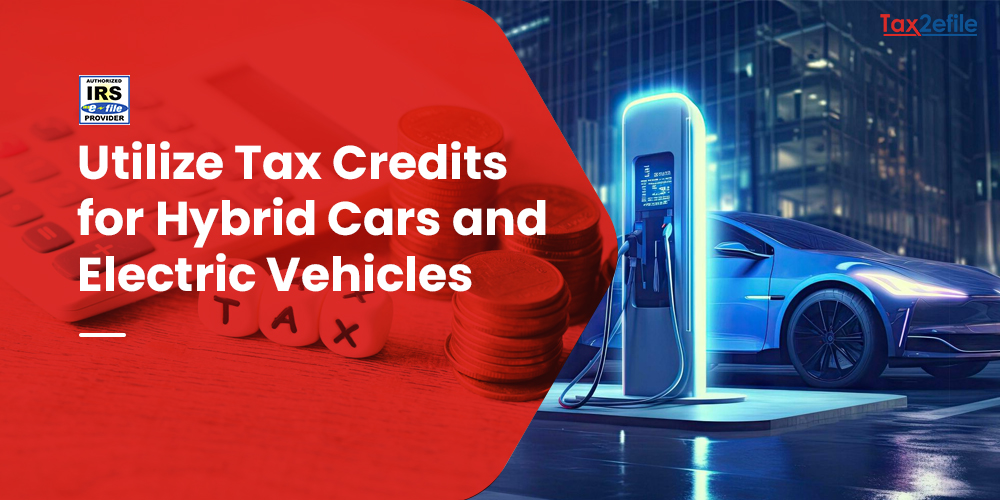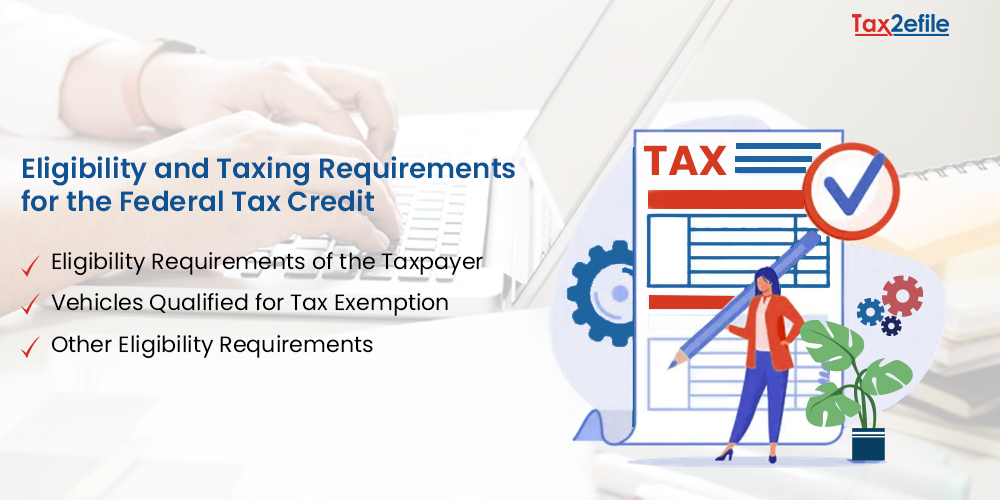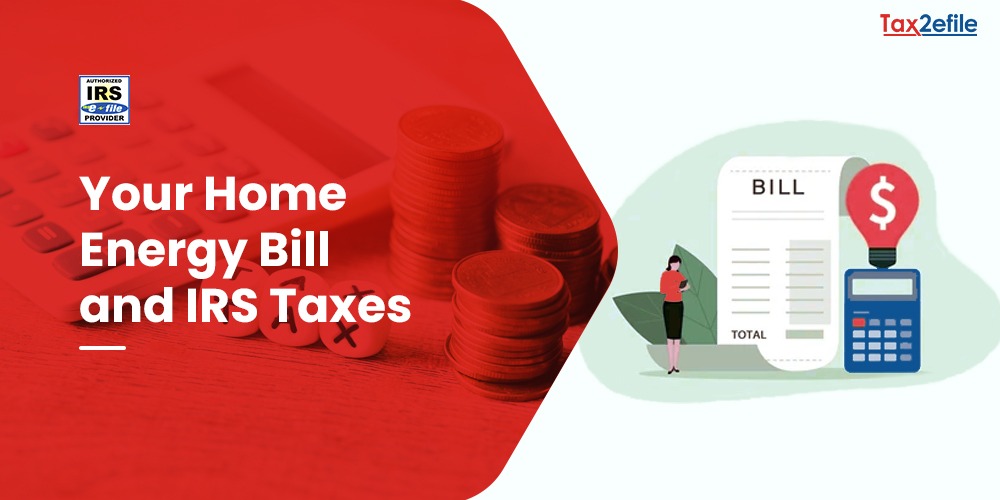- May 23, 2024

The Internal Revenue Service has offered tax credits for hybrid cars and electric vehicles. If you are considering buying a new car, then taxpayers should consider the list of vehicles that are eligible to increase the tax refund. Federal tax credits for hybrid cars and electric vehicle tax credit include specific EV vehicles that are qualified for a tax credit of up to $7,500. Though the initial cost of these vehicles is holding the taxpayer back, the tax credits can offer some relief. The goal of this tax initiative is to encourage consumers to buy an electric vehicle, for an initiative to promote a clean environment, and to reduce reliance on vehicles powered by internal combustion engines that are fueled by gasoline and diesel.
Table of Contents
The Federal Tax Credit for Electric Vehicles – Unlocking Potential Savings
In 2022, the Inflation Reduction Act of the United States includes new tax provisions, related expansions, and extensions of tax benefits related to healthcare and energy efficiency. Since the passing of this act, the tax credit for hybrid cars and electric vehicles also referred to as the clean vehicle credit, has been modified and expanded.
Tax credits for electric vehicles and plug-in hybrid cars could be a dollar-for-dollar reduction on the taxes that one owes for the year, which could be up to $7,500, as well as saving money on gasoline for hybrid cars. The different types of electric vehicle initiatives for hybrid cars and EVs are as follows.
- For new fuel-cell electric vehicles purchased after 2023 and new plug-in vehicles, taxpayers can receive a tax credit of up to $7,500.
- For pre-owned fuel cell electric vehicles and plug-in vehicles purchased in or after 2023, taxpayers can receive a tax credit of 30% of the purchase price for up to $4,000 for a qualified used vehicle purchased for $25,000 or less from a qualified dealer.
- For fuel cell electric vehicles that are purchased before 2023 and for new plus-ins, the new owners can receive a tax credit of up to $7,500 for new vehicles that are purchased before 2023. The amount of credit will vary on the basis of the battery capacity.
- For electric vehicle recharging properties placed in service after 2023, the home, facility, and businesses are eligible for tax credits. This can save the taxpayer up to 30% on the cost of installing the infrastructure.
It has to be noted that these are tax credits and not tax deductions. Let us discuss how much is the federal tax credit for the new electric vehicles.
How Much is the Federal Tax Credit for New Electric Vehicles?
The plug-in hybrid, fuel-cell electric vehicles, and all-electric vehicles purchased new or after the year 2023 are eligible for federal income tax credits for up to $7500. The availability and amount of the credit will depend on several factors, including the vehicle’s final assembly location, the battery component, the MSPR, the critical mineral sourcing composition of the vehicle, and the modified adjusted gross income of the vehicle owner.
Eligibility and Taxing Requirements for the Federal Tax Credit
The taxpayer should meet the following requirements in order to qualify for the eclectic vehicle tax credits.

Eligibility Requirements of the Taxpayer
In order to qualify for tax credits for electric and plug-in hybrid vehicles, the taxpayer must use the vehicle for their own use and not for resale. They should also primarily use the vehicle within the United States. Additionally, the adjusted gross income should not exceed $300,000 for married couples who are filing jointly, $225,000 for heads of households, and $150,000 for all tax filers.
A taxpayer can make use of their modified AGI from the year they took ownership of their vehicle or the year before, whichever is less. Modified AGI should be below the threshold in one of the two years to claim the credit. The modified adjusted gross income is the amount the taxpayer reports on Form 1040, line 11, along with any amount on line 45 or line 50 of Form 2555 (Foreign Earned Income). Any amount excluded from the gross income should also be included if it was received from Puerto Rico or American Samoa.
This credit is non-refundable and cannot be carried forward. Therefore, taxpayers should ensure that they have a tax liability in order to take advantage of the credit.
Vehicles Qualified for Tax Exemption
In order to qualify for the electric vehicle tax credit, the vehicle must meet the below-mentioned requirements.
- The vehicle should have a gross vehicle weight of less than 14,000 pounds.
- The electric vehicle should have a battery capacity of at least 7 kilowatt hours.
- An eligible vehicle should be made by a qualified manufacturer, but fuel cell vehicles need not be made by a qualified manufacturer to be eligible for tax exemptions.
- The vehicle should be new and not have been previously registered, purchased, titled, or used for any other purposes.
- The seller is also required to report the name of the taxpayer and the taxpayer identification number to the IRS in order to be eligible to claim the credit.
- For electric vehicles placed in service on or before January 1st, 2024, the dealer should register with the IRS Energy Credits Online. The vehicle must also be approved through Energy Credits Online during the sale.
Other Eligibility Requirements
In order to be eligible for tax credits, vehicles and cars that qualify for the EV tax credit must undergo final assembly in North America. Also, the credit amount for the vehicles that are placed in service will depend on the minerals and the battery sourcing requirements of the vehicle. The vehicle that meets both these eligibility criteria will be eligible for the complete tax credit of $7,500. A vehicle that meets only one of these requirements will be eligible for a tax credit of $3,750 only. Vehicles that do not meet both these requirements are not eligible for credit. Taxpayers should check with the dealer, regarding these tax credit eligibility requirements of the vehicle.
Claiming Federal Tax Credits for Hybrid Cars and Electric Vehicles
In order to claim the tax credits for electric vehicles and hybrid cars, the eligibility criteria and the credit amount would be determined at the time of sale of the vehicle. The IRS Energy Credits Online website will be doing this assessment. To accomplish the assessment, the dealer is required to complete and submit the following documents to the Internal Revenue Service.
- The dealer should submit the time of sale report online
- The dealer should provide a copy of the time of sale report to the buyer, which they can use to claim the credit.
- Taxpayers can either claim the credit on their own tax return Form or on Form 8936.
- Taxpayers can also transfer the credit to the dealer, and apply the same in their final purchase cost.
- But, it is important that taxpayers fill out Form 8936, to report their eligibility for the credit, and their decision to transfer the credit to the vehicle dealer.
Leveraging on State Tax Credits for Additional Benefits
In order to avail tax credits on electric vehicles, Taxpayers have to note that this credit is not valid for pre-owned vehicles that are purchased before 2023. Also, vehicles should have been purchased from a dealer and have a sale price of at least $25,000 or less. It should also be of the model that is two years prior to the calendar year. The vehicle should be of primary use in the United States only. It should have a gross weight rating of fewer than 14,000 pounds and should be an eligible fuel cell vehicle or plug-in electric vehicle that has a battery capacity of at least 7 kilowatt hours. Above all, the dealer should be registered with the IRS Energy Credits Online, and the Energy Credits Online should also approve the vehicle during the time of sale.
Apart from claiming the tax credits under the Federal Inflation Reduction Act of 2022, the vehicle owner can also claim additional incentives through local and state programs for having clean vehicle ownership. For instance, CVRP, California’s Clean Vehicle Rebate program, offers the best financial incentives for buying electric vehicles in California. Taxpayers should also check their local and state programs to make sure they review all possibilities to avail of tax reductions.
Maximize Your Savings
The all-electric, fuel-cell electric vehicles and the plug-in hybrid vehicles that are purchased during or after 2023, may be eligible for the federal income tax credit for up to $7,500. This credit is not refundable, so the taxpayer cannot get back more on the credit than what they owe in taxes. Also, they will not be able to apply any excess credit for future tax years. Vehicle owners can contact the taxing experts at Tax2efile to get detailed instructions on reporting the taxes for electric vehicles and save big on their taxes.

